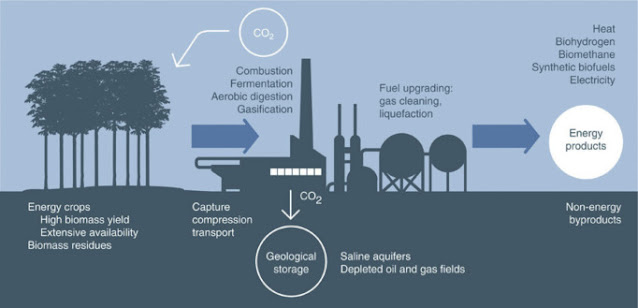Search This Blog
An Environmental website whose primary focus is to help everyone understand the impact humans have on the physical environment with resources that help us achieve what we call a safe and clean environment.
Featured
- Get link
- X
- Other Apps
Harnessing the Power of Nature: Biological Carbon Capture and Storage
As the world continues to grapple with the effects of climate change, scientists are looking for ways to mitigate the amount of carbon dioxide (CO2) that is released into the atmosphere.
One promising solution is biological carbon capture and storage (BCCS), a process in which plants and other organisms capture and store carbon dioxide from the atmosphere.
In this article, we will explore the science behind BCCS, its potential benefits, and some of the challenges that must be overcome for it to become a widely adopted solution.
The Science Behind Biological Carbon Capture
Plants have the amazing ability to convert carbon dioxide and water into organic compounds through the process of photosynthesis.
During this process, they absorb CO2 from the air and convert it into energy-rich sugars, which are then used to fuel their growth.
From Science Direct. https://bit.ly/3Bncr0R
Some of the carbon that is captured in this way is stored in the plants' biomass, while the rest is released back into the atmosphere during respiration.
However, not all of the carbon that is captured in plant biomass is immediately returned to the atmosphere. When plants die and decompose, some of the carbon in their tissues is sequestered in the soil. This natural process of carbon storage is the foundation of BCCS.
In addition to plants, other organisms such as algae, bacteria, and fungi also have the ability to capture and store carbon.
For example, algae can capture carbon dioxide through photosynthesis and convert it into lipids, which can be used to produce biofuels.
Similarly, certain bacteria can use CO2 as a carbon source to produce bioplastics.
Benefits of Biological Carbon Capture
One of the main benefits of BCCS is that it is a natural process that does not require any complex technology or infrastructure.
In contrast to other carbon capture and storage (CCS) technologies, which often involve expensive and energy-intensive processes such as carbon capture from power plants and underground storage, BCCS can be implemented in a variety of settings, from forests and agricultural lands to urban green spaces.
Another benefit of BCCS is that it can help to increase biodiversity and improve soil health. By promoting the growth of plants and other organisms, BCCS can provide a habitat for wildlife and enhance the ecosystem services that are provided by natural areas, such as pollination and water filtration.
Challenges and Limitations of Biological Carbon Capture
Despite its potential benefits, there are several challenges and limitations associated with BCCS. One major limitation is that it can only capture a fraction of the carbon that is emitted by human activities.
According to some estimates, BCCS could only capture between 10% and 20% of global CO2 emissions.
This means that other carbon mitigation strategies, such as reducing fossil fuel use and increasing energy efficiency, will still be necessary to meet climate targets.
Another challenge is that BCCS is vulnerable to climate change and other environmental stresses. Drought, heat waves, and other extreme weather events can reduce the ability of plants and other organisms to capture and store carbon.
Additionally, BCCS can be limited by the availability of land and water resources, as well as by competing land uses such as agriculture and urbanization.
Conclusion
Despite its limitations, biological carbon capture and storage have the potential to play an important role in mitigating climate change.
By harnessing the power of nature, we can take advantage of the amazing ability of plants and other organisms to capture and store carbon.
With continued research and investment, we can work towards a more sustainable future in which we can live in harmony with the planet that sustains us
- Get link
- X
- Other Apps
Popular Posts
Environmentally Persistent Pharmaceutical Pollutants (EPPPs): A Growing Threat to Our Ecosystems
- Get link
- X
- Other Apps
Circular Economy Important Websites You Should Look At
- Get link
- X
- Other Apps


Comments
Post a Comment